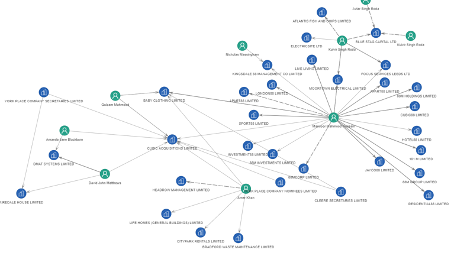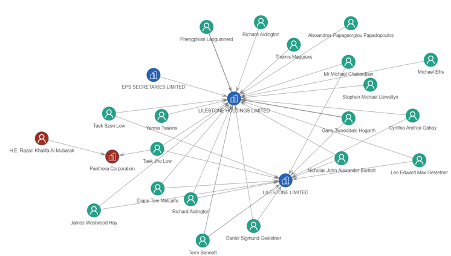
Adverse media engineering encompasses a set of tools and techniques aimed to change, reduce or eliminate the negative image of an individual or a company in the media.
Since ICIJ's release of Panama Papers, the term adverse media gained traction, and all major companies are trying to do their best in mitigating the risk of appearing in a media article that depicts them negatively. Big corporations and especially those listed on stock exchanges, have dedicated departments dealing with external communication. Moreover, dedicated services are available to optimize the on-line image of an individual or a company.
In the whole debacle around adverse media, most specialists ignore one critical angle. How do criminals perceive adverse media, and what are they doing about it?
High profile criminals are much more concerned about their image in the media than a regular business owner or even a large corporate for two main reasons. On the one hand, adverse media can have a significant impact on the way justice might handle their cases. On the other hand, the media may offer unique insights about them, which otherwise would not constitute public information. For instance, in many jurisdictions, including France and Germany, the matters prosecuted in criminal courts are not publicly available. The information may be disclosed to members of the public if and only if an accredited journalist attends the court and publishes the key points of that matter. In such cases, adverse media becomes the only source of information offering details about the criminal background of an individual.
But, offenders and especially those involved in financial crime, found a straightforward way to deal with this issue. A significant number of fraudsters reconvert after their criminal carriers reach an end and go into more traditional activities, mostly in the technology sector. Nevertheless, the past haunts them, and the new business partners they may have could search and discover their dark history. And here, adverse media engineering comes into the equation. We can see several services providers that can "clean" the on-line image. They use several techniques, such as:
- engineering the web searches to deprioritize the negative media
- spoofing the web with new media content, thereby diminishing the weight of adverse media
- cleansing social media pages or public sources like Wikipedia
- erasing the original media source, through hacking it or persuading the editor to delete it.
“Always be nice to bankers. Always be nice to pension fund managers. Always be nice to the media. In that order.”
John Gotti, former boss of the Gambino crime family
Focus: Unexplained Wealth Orders
Since the recent leaks, ICIJ's articles portrait the United Kingdom in a rather gloomy light. London seems to be the capital of financial crime and the leading hub for money laundering. This characterization is overstating and conflating facts and speculations. In fact, since 2017, British courts took a proactive approach for tackling crime by issuing the so-called UWOs.
An Unexplained Wealth Order ('UWO') is a special type of court order issued by a British court obliging an individual or a firm to disclose the sources of wealth. These powerful orders do not require any proof of alleged criminal involvement of a target. The orders operate under the British civil recovery regime and give the powers to law enforcement agencies to seize assets, when there is no sound explanation of their origin.
Last week, the National Crime Agency seized multiple properties owned by Mansoor Mahmood Hussain (DOB: April 1980), a Leeds based flamboyant socialite. Mr Hussain has allegedly multiple ties with prominent figures of the Northern England underworld. According to the NCA, he laundered funds for criminal gangs involved in murders and drug trafficking. Moreover, his wealth encompassing over 45 luxury flats in Leeds can be explained only from laundering funds from criminals. Mr Hussain had interests in a few dozen firms incorporated in Leeds and Bradford. None of his firms paid corporate taxes since their inception. The British court issued a UWO and confiscated properties with a nominal value of 10 million pounds.

FinCEN Files and Cyprus Papers: Jho Low
FinCEN leaks could not miss the topic of 1MDB fraud. ICIJ unveils new information from the never-ending saga of the mastermind that engineered the siphoning of the Malaysian bank. The leaked SARs point at JP Morgan and other banks that reported more than 100 suspicious transactions since 2013 involving entities related to Taek Jho Low (DOB: November 1981).
The controversial Malaysian financier with domiciles in Hong Kong and Singapore was a beneficiary of "residence for investment" program in Cyprus. His name appears in the Cyprus papers, as he got a Cypriot passport in 2018.
Low controlled two companies based in the United Kingdom: Lilestone Holding Limited and Lilestone Limited. He also had a firm called Panthera Corporation, based in Wyoming, United States. Amongst the directors of the American firm, one can find Razan Khalifa Al Mubarak, who manages the Environment Agency of Abu Dhabi. The Department of Justice is still seeking Low concerning his accusations of money laundering and corruption related to the 1MDB affair.

Word on the street: Albanians are taking over
Since the early 2000s, the European organized crime is in a continuous transformation. The attrition of the Southern Italian groups and the expansion of the European Union to the East brought new players into the picture. Amongst these new groups, a particular role is played by Albanian speaking groups, encompassing gangs from Albania, Kosovo and Northern Macedonia. In the beginning, Albanians subcontracted work for the more established syndicates like 'Ndrangheta or Sacra Corona Unita. But, over time, they grew apart in a fully-fledged transnational organization taking the lead over drug trafficking and prostitution.
During the pandemic outbreak, the retail price of cocaine plummeted with more than 20% across the major European cities, due to a decrease in demand. Therefore, the operating margin of the leading drug dealing crime groups went through a massive contraction, thereby exposing the transporters, the wholesalers and the retailers to additional risks.
In late September, the Dubai police raided the stronghold of the Albanian clan "Kompania Bello" confiscating over four tonnes of cocaine with a street value of over 1 billion dollars and not less than 5.5 million euros in cash. The investigation underlines that Albanian clans have developed a full logistic chain for the traffic and distribution of cocaine in Europe. Moreover, they have also the capacity to launder the proceeds of the crime efficiently through the so-called fei-ch'ien system, extensively used in Asian countries. Seemingly, the rising stars of international drug trafficking are bypassing the traditional circuits from Spain and Italy, which hold for a few decades, the key to the gates of cocaine import in Europe.